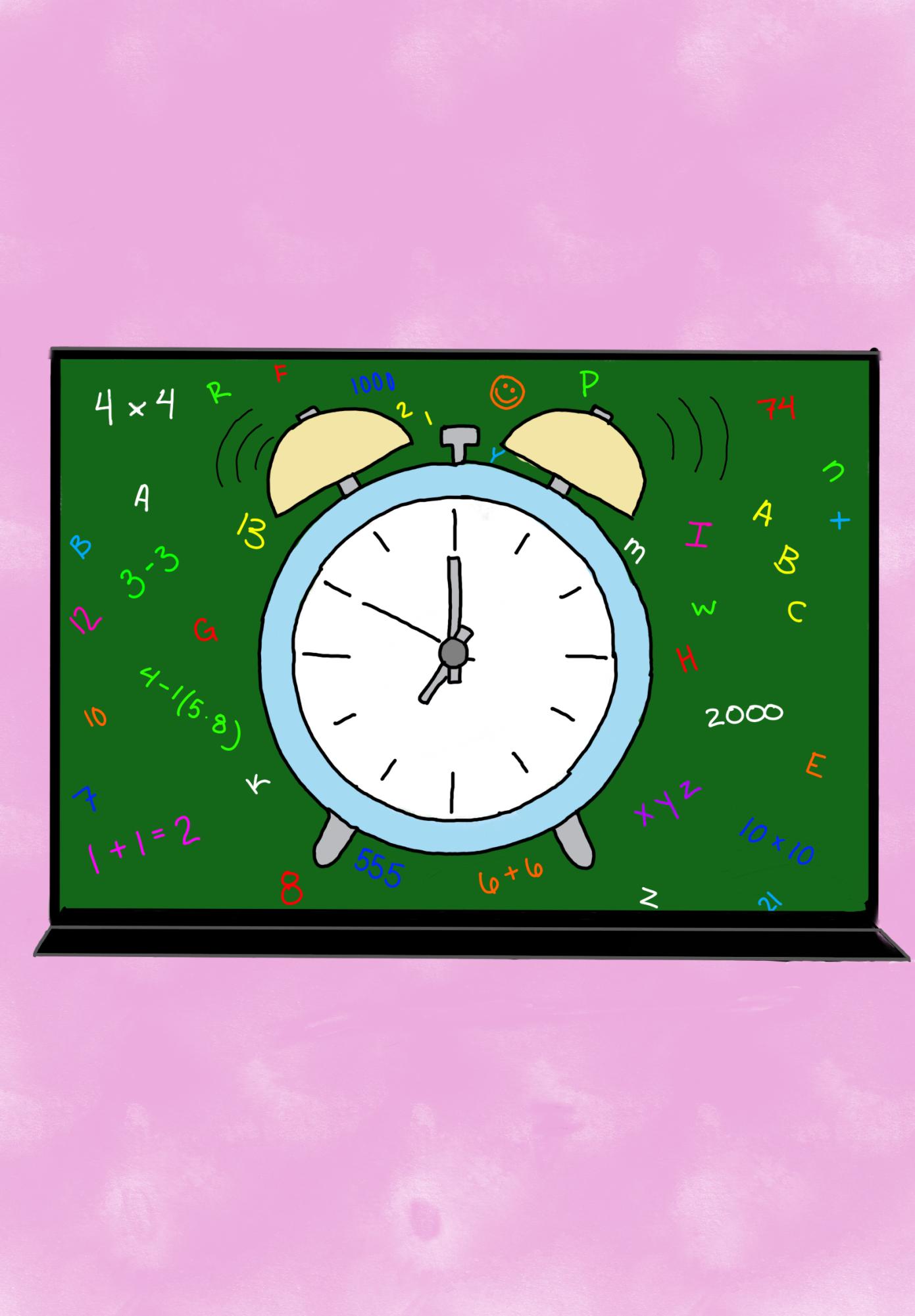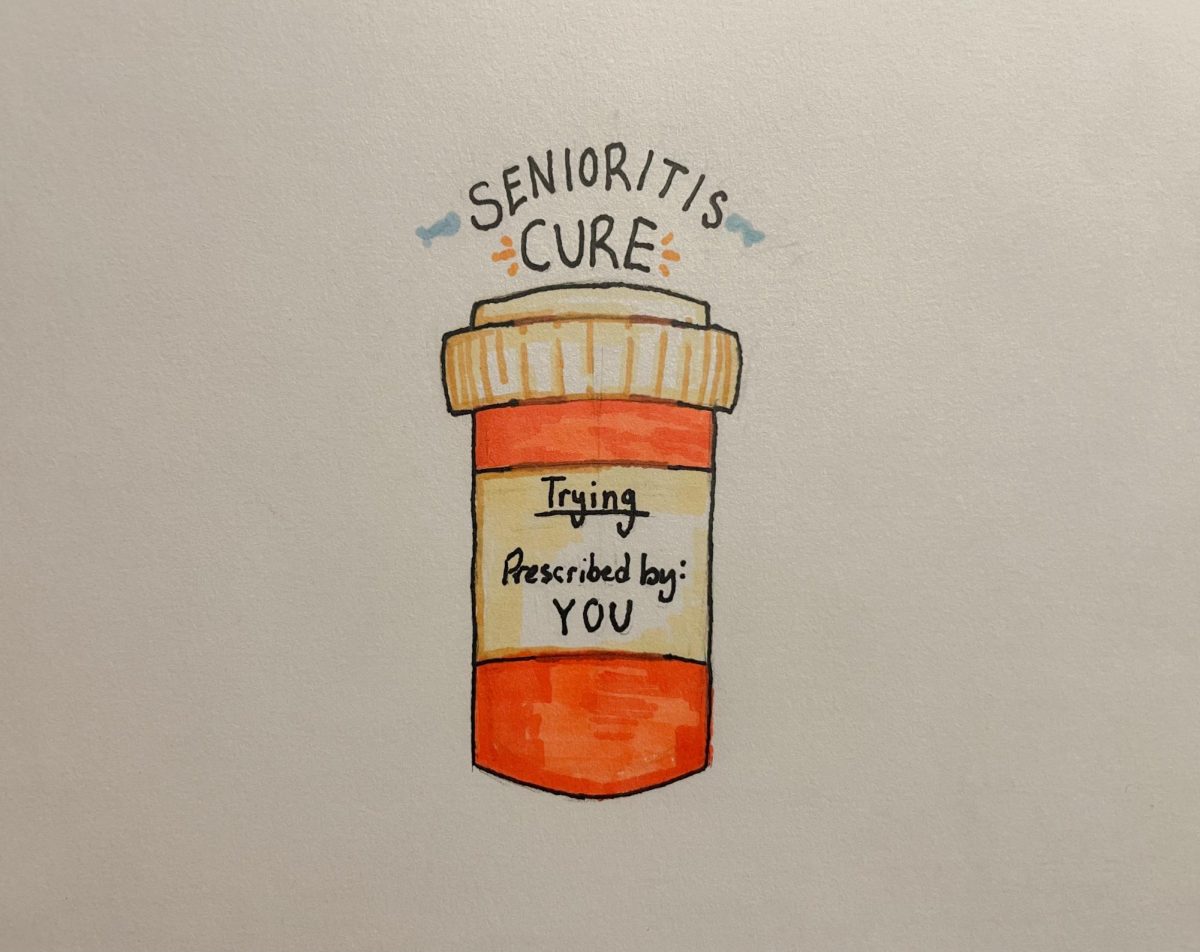Pushing back school start times (Editorial/Op-Ed)

We’ve all been there – your alarm blares at six in the morning, your eyes are heavy, and you think, “What is the worst thing that can happen? An extra fifteen minutes would be really nice.”
That is the reality for many students of all ages; feeling academic pressure to keep up with assignments, exams, and extracurricular activities, fifteen extra minutes of sleep in the morning seems like the only solution.
As a senior in high school, having been in school since PreK when I was four, I think pushing school start times is a quick-fix solution and would do more harm than good.
According to the U.S. Bureau of Labor Statistics, “Workers are most likely to be on the job between eight a.m. and five p.m.” Pushing school start times back will ruin the day-to-day dynamic followed by most American households. Parents who work nine to five Monday through Friday then aren’t capable of dropping their children off at school and would require extra means of transportation, whether that be other family members, hiring nannies, or even finding bus routes connected to their neighborhood, which for some coming from far away, might be impossible.
For parents who work in rigorous fields with strict schedules, delaying start times will add extra burdens. For example, the average cost of childcare in Colorado is $1,200/month. For many, this is unnecessary and parents who work are more than capable of taking their children to school before work when school starts at an appropriate time.
For many parents, especially those of newly schooled children, and even the ones who have high school-aged students, morning drop-off is the icing on the cake to a bad morning where you’re running late, the left shoe is on the right foot, and there is a veil of white snow covering the roadway.
However, many studies have shown that the time spent with your child in the early morning is “truly invaluable”. A 20-minute uninterrupted ride to school with Mom was the best part of my whole non-licensed life; I could roadmap my day while listening to only the best SiriusXM talk radio and follow up with her when I got home.
Pushing back school start times, even by an hour, elongates the school day for all students. If school started at 8:45 a.m. instead of 7:45 a.m., dismissal would be nearly four in the afternoon. For most students, that is when extracurricular, after-school activities are starting. No matter the way the cookie crumbles, someone will always find something to complain about in the education system.
If school ends at four p.m., athletic practices are therefore running later, games are later, and students with after-school jobs are forced to work later. As per the National Center for Education Statistics, on average, students in Colorado have a seven-hour school day whereas students in Connecticut and Delaware have six-and-a-half-hour days. In spite of that, students in Connecticut and Delaware spend 181 days out of the 365 in school on average, whereas Colorado students spend 171.
The less time students spend at school during the day increases the amount of weeks school is in session – possibly eating into their summer vacation.
Much like lions, chimpanzees, and even the ruffled grouse, humans are creatures of habit. Using myself as an example, there is no way I’d be able to switch around my schedule for a later school start time when I have been waking up at six thirty a.m. since kindergarten and am used to the routine that comes with that. Although my school day starts a little later, thanks to off blocks and an awesome counselor, I am still waking up two and a half hours before I need to be out the door (somehow I still leave late every morning, but this isn’t a question of my time management skills). Self-disciplining and learning what morning routine is best for me drastically changed my ability to wake up early.
Since the main argument for pushing back school start times is to allow for more sleep, especially in teenagers, instilling new bedtime and morning routines is the only feasible way to see a change.
According to GoodRx, to produce more melatonin earlier in the night to fall asleep faster, teens can expose themselves to sunlight early in the morning to then trigger nighttime melatonin production sooner, reduce nightly screen time, and watch caffeine intake.
As much as I love a good sparkling orange Celcius to get me through the rest of my school day, it is more worth it to get a good night’s sleep before and feel energized without it.
Driving back school start times is a one-size-fits-all solution to deeper problems in education; giving students access to ample nutrition and adequate breaks during the school day is a way to improve academic performance without adjusting the hours on the clock.
BEEP, BEEP, BEEP! A brutal, screeching alarm wrenches you out of your slumber. Dreading getting up, you slowly drag yourself out of bed and take a shower. The time? 6 o’clock in the morning. Wow, that’s early, you think to yourself. And, on top of it all, now you have to go to school.
Nobody likes beating around the bush, so I’m going to put it bluntly: school starts too early. Like … way too early. So early, in fact, that a typical student is more likely to engage in bad behavior, be less productive, and cause caffeine addiction. Now, it’s not going to school, or even just waking up early that could cause this to happen to somebody; it’s the fact that school starts so early, and after-school activities and homework keep students up incredibly late, that the majority of students are deprived of sleep because of it.
A student usually gets home from an after-school activity at around six, sometimes even later. Then, for some, there is a pile of tons of homework from the AP and college classes the district tells us to take, and that usually puts teens at the “getting ready for bed” stage at around 11:30 or midnight.
We believe that our district – who encourages us to take these hard classes, and to participate in clubs, sports, and activities – should make it easier for us to engage in activities they so strongly encourage us to take by starting school an hour later.
According to research from 2011, insufficient sleep on an average school-nights was reported by just under 70% of students. Almost any teenager can attest to the fact that sleep is not an easy thing to come by during the school year. With that, in the fifteen years since, sleep has likely become more of an issue with the influx of technology and social media.
With no sleep comes, ironically, sleepiness. But, scared of getting yelled at by your math teacher for sleeping in class, you have to stay awake by any means necessary. Your desperation turns into exceptionally high doses of caffeine.
According to other peer reviewed studies, “Acute caffeine intake can delay sleep initiation and reduce sleep intensity, particularly when consumed in the evening.” The consumption of caffeine reduces your capability to sleep—especially when you consume it in the afternoon and evening. This research doesn’t even consider teenage boys AND girls who are more heavily affected by extremely high doses of caffeine.
So every time you stay up ridiculously late cramming for a midterm, guzzling Red Bull after Red Bull, you are an example for these studies. This all-nighter is not good for your brain, and having to go school so early drops a bomb on practically any kind of functions your body does naturally… especially those of decision-making.
Back on the study on the relationship between sleep and risk-behavior, the lack of sleep leads to poor decision-making, and riskier behavior among adolescents. Basically, if a teen is sleep-deprived—which the majority of us are at this point—they are likely going to make poor health, mind, and social decisions and engage in illegal activities (such as consuming drugs, etc.). Perhaps the reason so many kids vape in the E-wing bathroom is because they are inhibited by a barely-functioning brain running on 3 hours of sleep.
Student productivity in many schools is rough. Sure, some of that is because of procrastination, laziness, or other excuses you have for “sleep deprivation.” Sleep is the most essential part of productivity in people of all ages; especially teenagers.
As per the University of Washington who conducted their own study of students, they found that, “Final grades were 4.5 percent higher for students who took [a] class after school start times were pushed back compared with students who took [a] class when school started earlier.” Who would’ve thought that, when kids are actually getting the proper amount of sleep per night, they would be getting better grades? Crazy stuff, really.
Yes, sleep (or the lack thereof), has massive consequences on student performance, work production, and behavior. Basic understanding of the brain has revealed a really puzzling fact: the brain matters. Like, a lot. If we aren’t properly recharging our brains by sleeping, then it’s going to just kind of… stop working. When teens don’t sleep enough, they’re more likely to make bad choices because (you guessed it!) their brain isn’t working properly. Teens also are less likely to learn in school because (you guessed it!) they’re tired and either sleeping or unable to focus in class.
Sleep is important, and so is your brain. And a proper eight-to-ten hours of sleep is necessary for basic daily functioning in school. But since teenagers are averaging some two hours less than the recommended amount of sleep, the overall functioning of their brains is practically burning at the stake.
St. Vrain Valley Schools needs to shift start times. That extra 45-minutes to an hour of sleep is huge for students.
Pretty please, Don Haddad, let us sleep in 45 minutes! We beg of you! We promise we’ll make better decisions and you’ll see improvement in our grades.
Your donation will support the student journalists of Mead High School. Your contribution will allow us to purchase equipment and cover our annual website hosting costs.
















Payton • Mar 3, 2025 at 11:42 am
Both of these are so good y’all ate